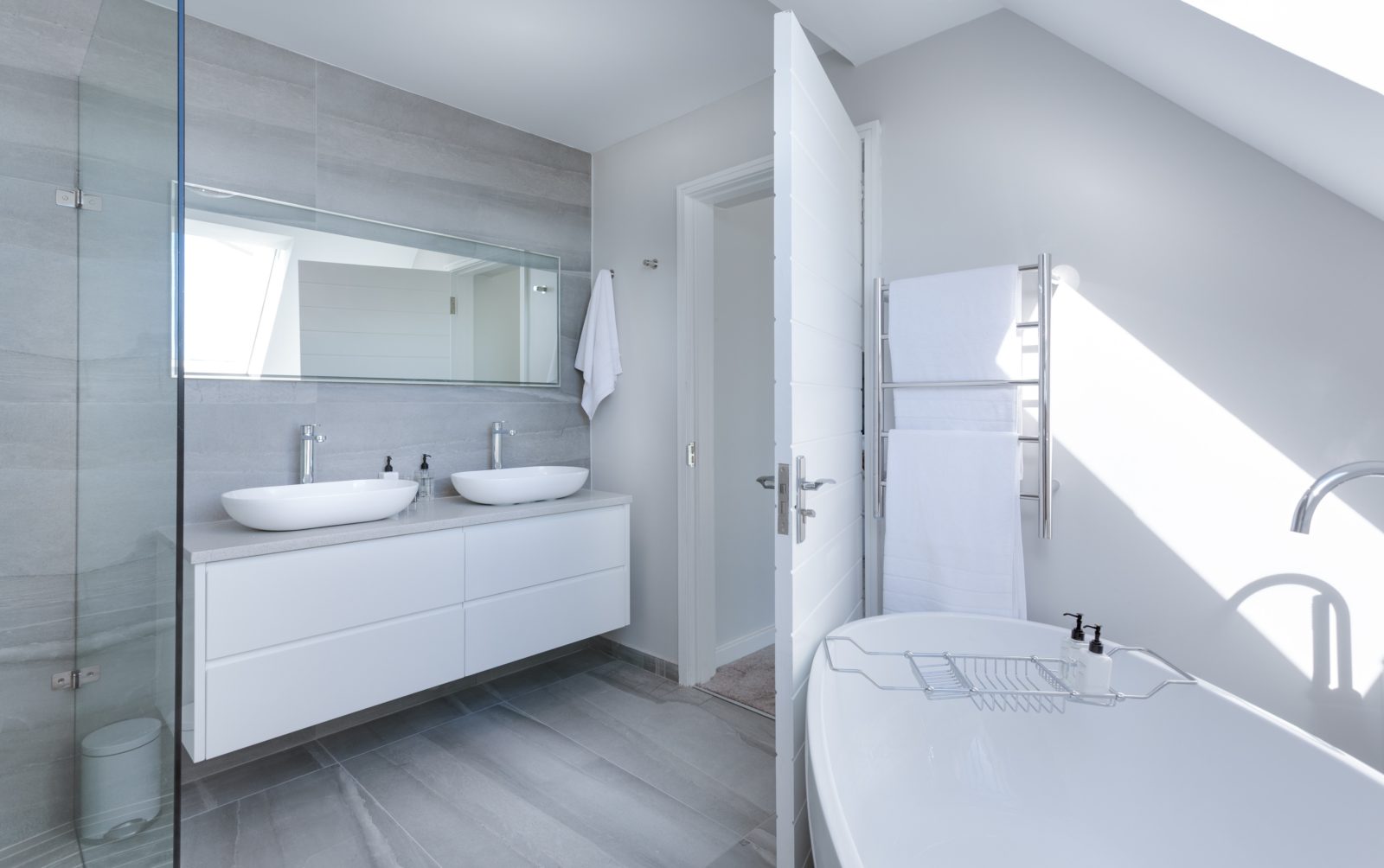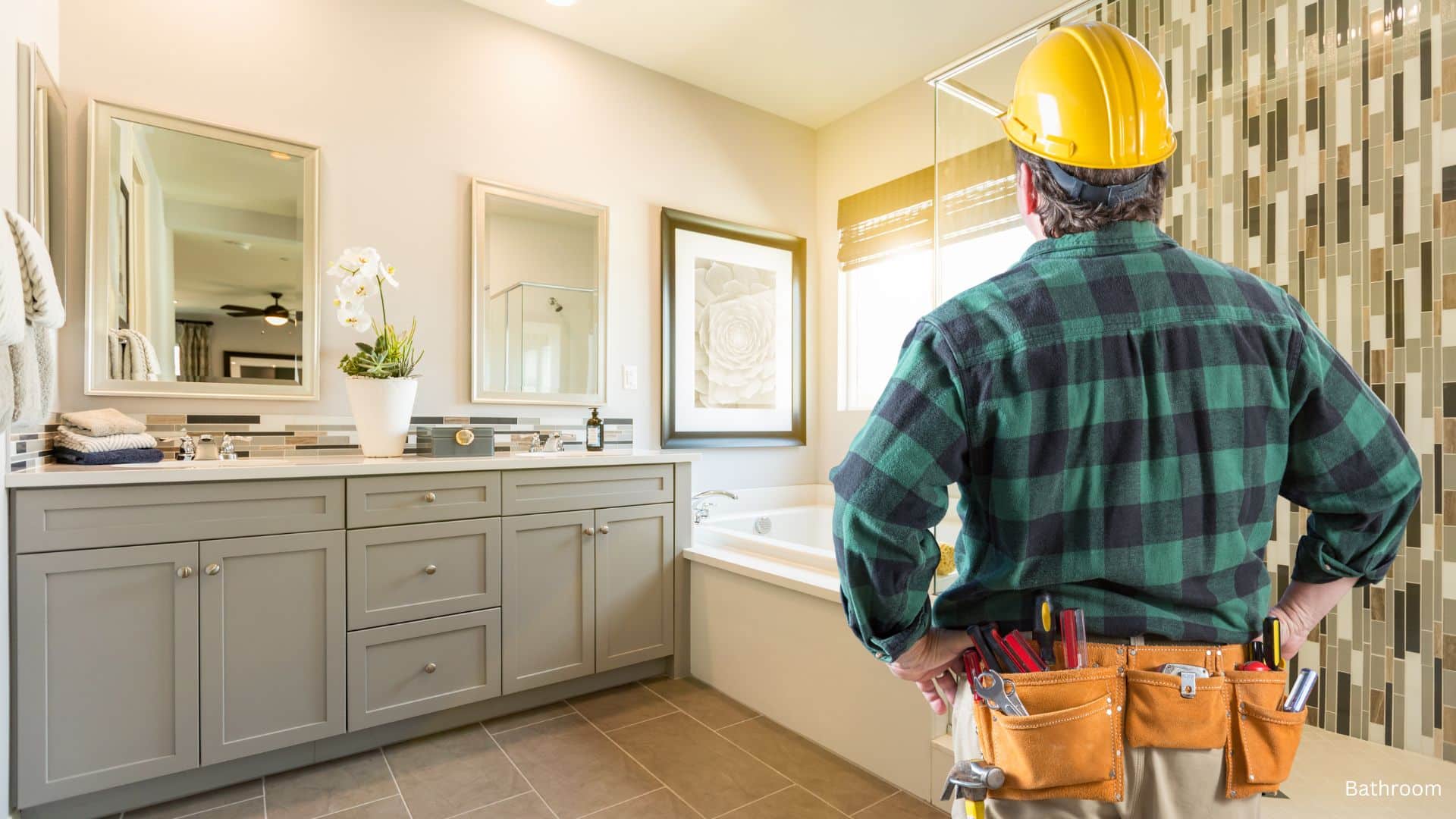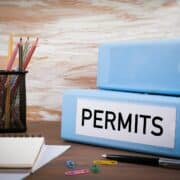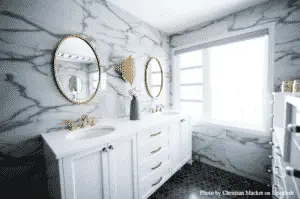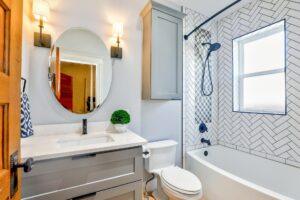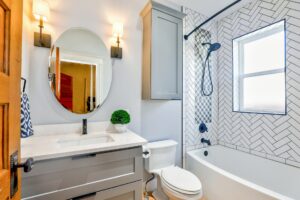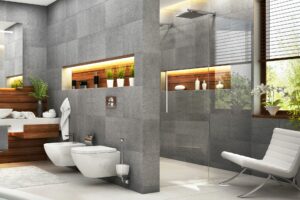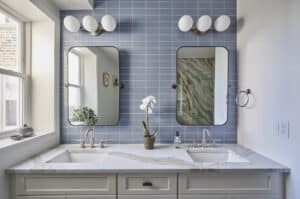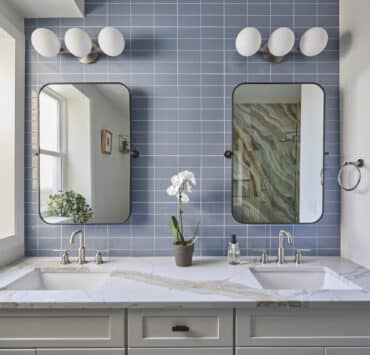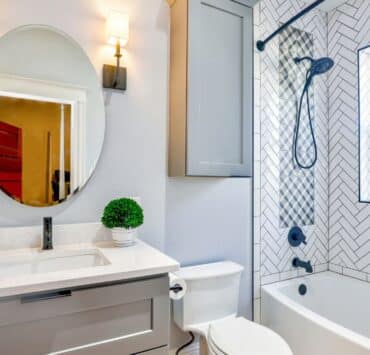Bathroom remodeling cost varies widely, starting from around $6,627 for moderate updates and escalating to $30,000 for a complete overhaul with premium materials. Alternatively, you can choose to do smaller upgrades, such as a new toilet, shower stall, or faucet, for under $500 each. Whether you’re envisioning a luxurious spa retreat or making gradual personalized adjustments, let’s embark on your bathroom renovation journey from the ground up.
How Much Does it Cost to Remodel a Powder Room?
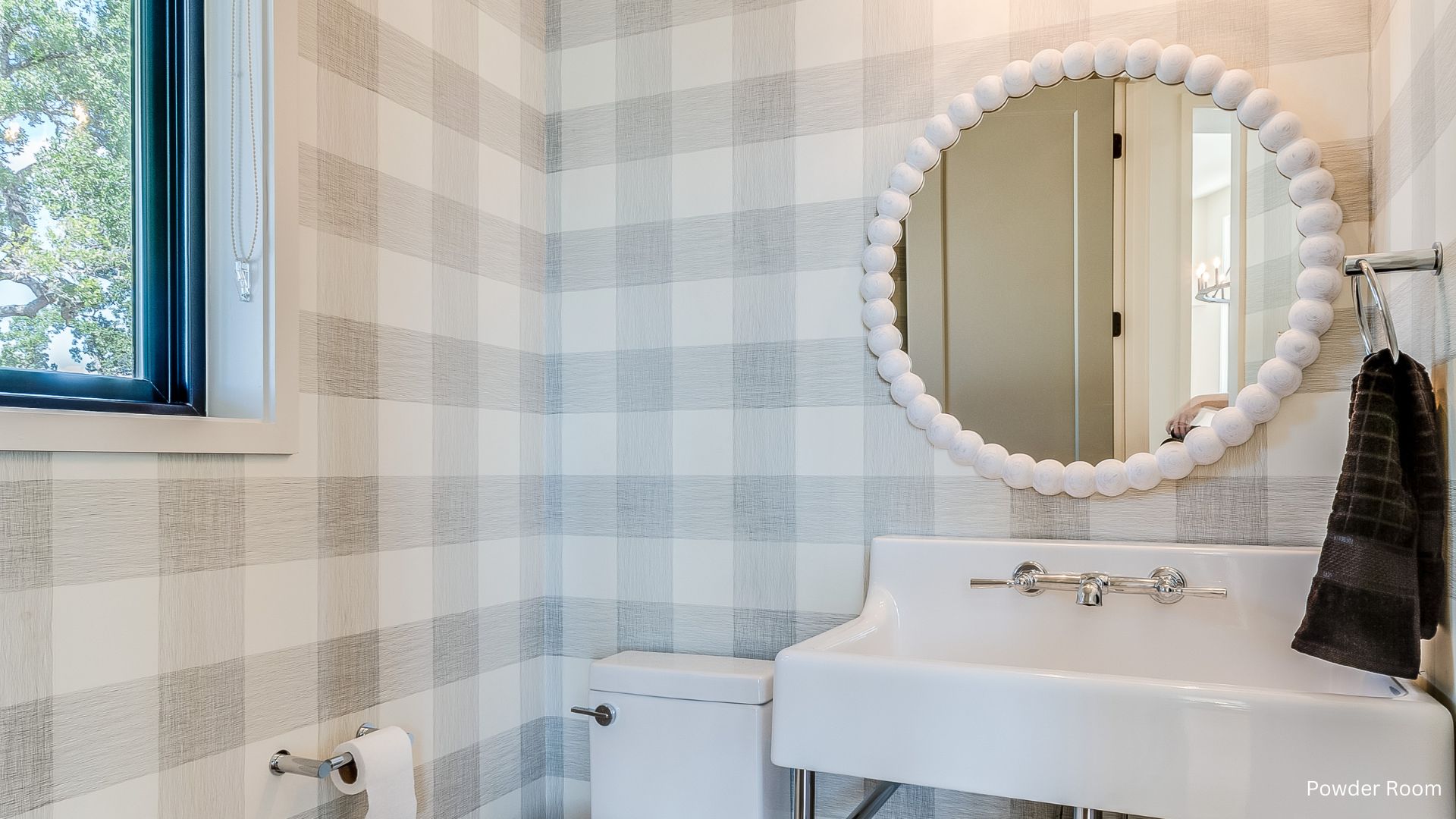
The typical expense for remodeling a powder room averages around $6,500. Costs usually range between $1,500 and $15,000 or even higher, contingent upon the extent of the renovation, the materials used, and whether you opt to handle some tasks yourself.
Besides enhancing your home’s resale value, remodeling can improve your powder room’s energy efficiency and transform it into a more relaxing space.
How Much Would It Cost To Remodel A Small Bathroom?
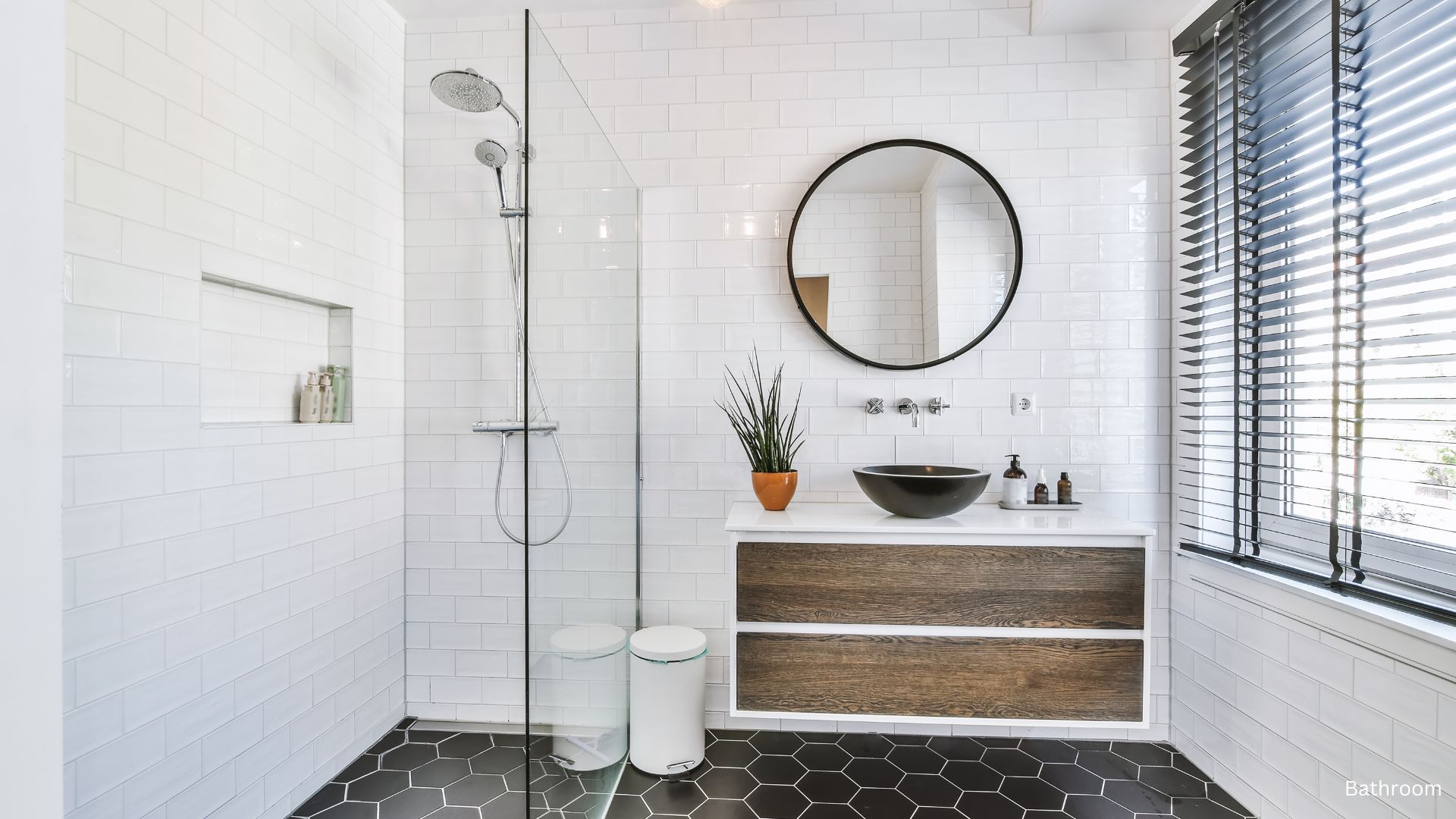
The general average for a small bathroom remodel cost will set you back around $6,500 to $10,000 for the typical 40 square foot bathroom.
With the given average, you can expect bathroom remodeling costs to range anywhere from $1,500 up to $15,000 or more. This of course will depend on the specifics of a remodeling job as well as the dimensions of your bathroom. A low end remodel averages at $70 per square foot while a more elaborate remodel can cost you $250 per square foot.
Bathroom Remodeling Cost Breakdown
Rather than viewing bathroom remodeling expenses as a single total, analyze each budget component individually to craft your ideal design. Factors such as your bathroom’s size, choice of finishes, fixtures, cabinetry, and labor will significantly influence the overall costs.
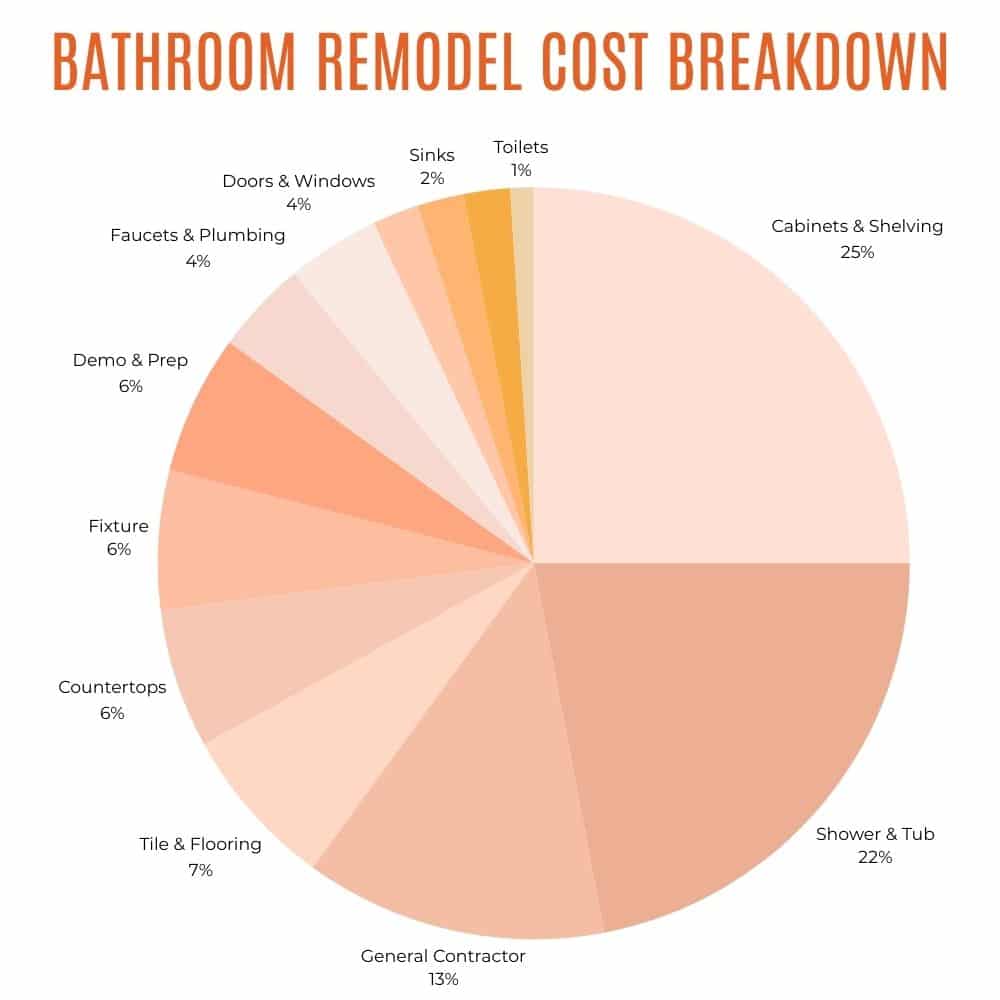 Bathroom Size & Layout
Bathroom Size & Layout
The dimensions and layout of your bathroom serve as the primary factors when estimating renovation costs. The expense typically ranges from $70 to $250 per square foot, depending on factors such as the bathroom type and your choice between basic or high-end finishes.
For instance, a standard small full bathroom, covering about 40 square feet, could incur renovation costs between $2,800 and $10,000. Conversely, larger bathrooms featuring amenities like a tub, separate shower stall, and double sinks, spanning over 100 square feet, may entail expenses ranging from $7,000 to $25,000.
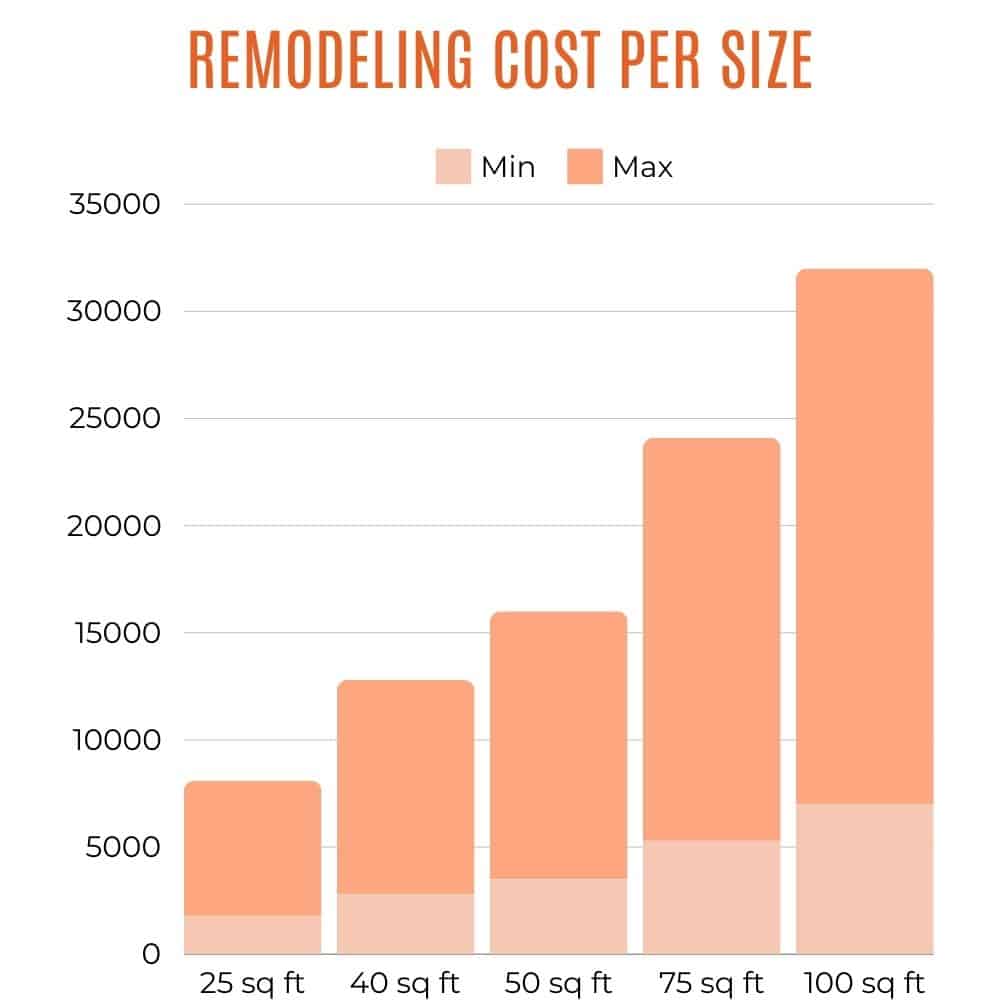
Cabinetry and Shelving
The price range for new bathroom cabinetry spans from $300 to $42,000, with the average cost per unit falling between $200 and $600. Key items such as storage cabinets, medicine cabinets, and vanities are significant components of your renovation, taking up a considerable amount of space beyond your primary plumbing fixtures.
It’s important to remember that your vanity not only accommodates your sink but also conceals plumbing. The more tailored your vanity design, the higher the costs associated with plumbing hookups will be. Opting for a custom vanity might increase your budget by up to $10,000 for both materials and labor.
As for shelving — essential for items like hand towels, candles, and decoratives like bathroom plants — the costs can vary. If you’re installing shelves yourself, you might spend between $50 and $100. However, opting for a professional installation could elevate your costs to around $1,300.
Countertops
A new countertop instantly elevates the look of any bathroom. Opting for high-end materials can profoundly transform the ambiance of the space. The cost for removing an old countertop and installing a new vanity top ranges from approximately $400 to $4,300, covering both labor and materials.
Delving into specifics, the material cost for standard vanities with pre-fitted countertops spans from $100 to $2,600. On the other hand, custom countertop materials can set you back $500 to $2,800. Factor in around $300 for the removal and disposal of the existing countertop and an additional $200 to $1,000 for the installation of the new one. Additionally, plumbing adjustments to fit the pipes and fixtures correctly may require a plumber’s expertise.
Furthermore, the price of countertop materials themselves varies. Below is a table showcasing some of these variations.
Shower and Tub
Many homeowners dream of transforming their shower or tub into a luxurious spa retreat during a bathroom makeover. The average installation cost of a new shower is around $6,800, but remodeling a shower can vary widely, from $200 to $15,000, depending on upgrade levels. Prefabricated shower kits might start at $600, including both materials and labor, but custom showers can exceed $10,000 due to the extensive labor and customization required for precise measurements, construction, and fitting.
When it comes to replacing a bathtub, expect to spend between $4,200 and $11,000. Options range from standard materials like acrylic or fiberglass to more upscale choices such as cast iron, steel, or cultured marble. Luxuries like clawfoot designs, jet systems, and freestanding models come with additional costs.
Significant modifications to your shower or bathtub setup, such as relocating pipes or accommodating special features like jets in freestanding tubs, might necessitate complex plumbing work. Here are some considerations for installing new tubs and showers as part of your bathroom renovation.
Tile and Flooring
The relationship between the flooring, shower, and wall tiles in a bathroom is unmatched by any other room in the house. Choosing new, waterproof materials is key to ensuring both durability and aesthetic appeal. On average, retiling a bathroom or installing new flooring costs about $12.50 per square foot, covering both materials and labor. The price of tiles alone ranges from $0.50 to $15 per square foot, although premium options can reach up to $35 per square foot.
Tiles that are budget-friendly usually feature conventional shapes like squares and rectangles and are simpler to install. However, opting for large marble slabs, uniquely shaped ceramic tiles, or materials enhanced for greater durability can significantly increase the cost. For those interested in the luxury of heated floors post-shower, the price for heating systems under tiles ranges from $20 to $40 per square foot.
Material costs for flooring vary from $2 to $22 per square foot, with installation labor adding an additional $0.60 to $4 per square foot. If you’re considering continuity with the rest of your home’s flooring, consider alternatives to bathroom tile like hardwood, vinyl, or polished concrete. Vinyl, in particular, can replicate the look of wood or stone, offering cost savings and improved longevity for your bathroom floor.

Sink
Sink installation costs range from $215 to $625, influenced significantly by the vanity type you select for your bathroom. Whether you envision a setup with dual sinks side by side or a stylish vessel sink perched atop the counter, the initial choice and installation of the sink itself is straightforward. However, this does not take into account additional factors such as fixtures, plumbing requirements, and integration with existing countertops.
Material choice also plays a critical role in determining the overall cost. Below are the prices for popular bathroom sink styles, including the cost of labor:
– Wall-mount sink: $350 to $650
– Drop-in sink: $60 to $500
– Undermount sink: $170 to $2,000
– Farmhouse sink: $360 to $2,000
– Pedestal sink: $330 to $730
– Vessel sink: $450 to $5,000
These figures highlight the wide range of options and price points available, allowing for customization according to personal style and budget.
Faucets and Plumbing
Refreshing your sink faucets can cost between $170 and $360, with the final price significantly influenced by the sink’s mounting style and the finish of the faucet. For instance, a traditional faucet that mounts to the countertop may run from $40 to $200, whereas a wall-mounted faucet could exceed $750. Additionally, opting for special finishes can increase the cost by $10 to $100, with prices varying as follows:
– Brushed nickel: $10 to $25
– Matte black: $20 to $40
– Graphite black: $20 to $50
– Matt gold: $25 to $50
– Bronzed gold: $50 to $100
– Champagne bronze: $50 to $100
When installing a new sink, toilet, or shower, a plumber might need to adjust your existing piping. The average expense for rough-in plumbing in a bathroom, especially for new construction or significant remodels, is about $7,000. The material cost for new piping ranges from $0.50 to $8 per linear foot. Professional plumbing services typically charge between $45 and $200 per hour.
On average, plumbing modifications during a bathroom renovation cost around $800. It’s important to note that further, more intricate repairs may be uncovered during the renovation process. Plumbing repairs can vary widely in cost, averaging $175 for straightforward issues like blockages to as much as $3,000 for more severe problems related to the water supply or waste disposal systems.
Toilet
On average, installing a new toilet will cost you about $375. Although it might not be the centerpiece like the shower or vanity, there are several stylish toilet options available, each with its own pricing:
– Two-piece toilet: $725
– One-piece toilet: $1,025
– Wall-mounted toilet: $675
– Low-flow toilet: $510
– Dual-flush toilet: $350
– Upflush toilet: $950
– Composting toilet: $900
– Smart toilet: $4,000
Bathroom Extras and Accessories
After covering the major installations, focus on the details that elevate your bathroom’s luxury and design. Consider adding:
– Towel racks: $100–$500
– Showerheads: $125–$150
– Cabinet hardware installation: $3–$200 per piece
– Bidet installation: $40–$1,500
Ventilation and Lighting
Proper ventilation is essential to prevent mold and water damage. A combined bathroom vent fan with light averages at $400, with high-end options reaching $425 and simpler models starting at $130.
Lighting is also crucial for both functionality and style. Installing a new light fixture ranges from $150 to $930, offering options from basic ceiling lights to luxurious chandeliers.
Doors and Windows
Updating doors and windows is also key. New door installation varies from $360 to $1,200. Additional costs include trim ($2 to $3 per linear foot) and hardware ($200).
Adding a new window or door might necessitate wall modifications, with new wall openings costing $120 to $200. Window replacement averages $280 while cutting a new window opening can be about $6,400.
Paint or Wallpaper
Refresh your bathroom with paint or wallpaper suitable for high-moisture areas. Painting costs range from $50 to $100, while wallpaper installation can cost $2 to $6 per square foot for materials plus $1 to $7 for labor.
Labor Costs
Labor typically accounts for 40% to 65% of your remodel budget, at rates of $50 to $75 per hour. Prices will vary based on the complexity of tasks and your location. Here’s a breakdown of professional fees:
– General contractors: 10%–20% of the project cost
– Plumbers: $45–$200 per hour
– Interior designers: $50–$200 per hour
– Electricians: $50–$200 per hour
– HVAC technicians: $50–$100 per hour
While you might tackle minor upgrades yourself, consider hiring professionals for comprehensive renovations.
Demolition and Preparation Costs
Expect the demolition phase of your old bathroom to contribute an additional $1,000 to $2,300 to your overall expenses. It’s important to verify that these demolition costs are included in your contractor’s quote. This should cover the dismantling and disposal of previous tiles, floors, and fixtures.
Permit Costs
The cost of local building permits varies significantly based on your location. Minor upgrades might not require a fee, but for extensive renovations involving plumbing or electrical modifications, anticipate spending between $100 and $1,000 on permits. Your contractor should be able to give you an estimate of these costs and handle the permit acquisition process for you.
Additional Factors Impacting Bathroom Remodel Cost
Serious home renovators understand that unforeseen expenses often accompany major projects like bathroom remodels. Here are some commonly overlooked costs to consider when budgeting for your renovation:
Design Cost
While interior designers typically charge between $50 and $200 per hour, for large projects like bathroom remodeling, they may offer a flat fee based on square footage or the scope of their services. Expect to pay around $5 to $15 per square foot, with a minimum fee of approximately $250 for smaller spaces like bathrooms. Unlike interior decorators, interior designers assist with layout, finishes, fixtures, and coordination with contractors.
Floor Plan Alterations
Changing the layout of your bathroom can add an extra $5,000 to your project’s cost. Unlike rearranging furniture in a living room, this involves relocating fixtures attached to plumbing and adjusting tiles to fit your new design. It may also require rewiring, framing, drywalling, and insulation. The overall expense of adding a new bathroom to your home ranges from $5,000 to $35,000. Additionally, you may need to hire a structural engineer for $100 to $200 per hour to inspect and provide recommendations for changes to walls, ceilings, windows, and doors, or when installing a heavy bathtub.
“Building codes for bathrooms are stringent, and compliance can be costly,”
says Bob Tschudi, a member of the Angi Expert Review Board and a general contractor in Raleigh, NC. “For example, a bathtub chandelier must be a certain minimum height, or large glass windows near slippery surfaces must be tempered.”
Electrical Work
Bathroom lighting is crucial for your new design, whether you’re updating the exhaust fan, adding vanity lights, or installing a chandelier. You may also opt to relocate outlets for convenience while blow-drying. Hiring an electrician costs an average of $150 to $500 or $50 to $100 per hour.
– Cost of a new outlet: $130–$300
– Rewiring the room: $2–$4 per square foot
– Cost of a new bathroom fan: $240–$550
Accessibility and ADA Compliance Features
Renovating a bathroom with accessibility in mind is essential for homes with elderly residents or those with mobility issues. While bathrooms can pose particular challenges, installing toilets, sinks, countertops, cabinets, and towel racks at appropriate heights can enhance accessibility. You may also need to widen door frames and remove shower curbs for wheelchair users.
Building an accessible bathroom from scratch averages $9,000, while adding individual fixtures can cost between $100 and $3,000. The cost of installing a walk-in bathtub ranges from $4,000 to $12,000. Converting your bathroom into a wet room, eliminating the need for a shower threshold and addressing waterproofing concerns, costs between $2,000 and $30,000, with an average of $9,000.
Water Damage Repairs
Contractors often uncover hidden moisture damage behind old bathroom tiles, tubs, walls, or flooring. Water damage restoration costs between $3.75 and $7 per square foot. Additional repairs, such as fixing leaky pipes, clogged drains, or poorly sealed fixtures, can increase the overall repair expenses. Addressing these issues promptly can prevent more costly damage to flooring or ceilings in rooms below the bathroom.
Smart Technology
Opting for modern amenities during your bathroom remodel allows for features like music-playing toilets, voice-activated controls, weather-reporting mirrors, and heated floors. Many smart devices can control water usage and temperature. Consider the following tech features for your bathroom remodel:
– Interactive mirrors: $1,000–$2,000
– Smart shower or showerhead: $300–$2,000
– Smart toilet: $2,000–$13,000
– Smart sink or faucet: $40–$2,000
Adjoining Room Adjustments
Bathroom renovations often align with broader home improvement plans, extending costs beyond the bathroom itself. Achieve a cohesive look by matching paint colors between your bathroom and adjacent rooms. Painting a room typically costs $2 to $6 per square foot. You may also choose to extend flooring seamlessly into a neighboring walk-in closet or hallway for an average of $12.50 per square foot.
Post-Construction Cleanup
While general cleanup and debris removal may be included in your contractor’s fee, you may prefer hiring a cleaning service for a thorough post-renovation cleaning, which costs between $70 and $170. Additionally, consider adding finishing touches to areas not renovated by your team, such as grout sealing for $0.90 to $1.60 per square foot or professional caulking for $1.25 to $4 per linear foot. Junk hauling for leftover materials averages $240, including potential dump fees.
Prefabricated vs. Customized Components
The choice between stock options and custom designs significantly affects costs for major installations and finishes. For example:
– Stock cabinetry: $100 for a small vanity
– Custom cabinetry: $3,000 to $10,000 for a small bathroom
– Prefabricated countertops: $100 to $600
– Custom countertops: $500 to $2,800
Tile patterns also impact costs, with intricate designs like herringbone or pinwheel increasing labor expenses to $16.50 per square foot, compared to simpler patterns at around $7 per square foot.
By opting for prefabricated components and basic tile designs, you can maintain a more budget-friendly approach. Instead, personalize your space with accessories like towels, shower curtains, plants, and other affordable items that can be easily swapped out.
| Factor | Average Cost Range |
|---|---|
| Design Expenses | $250 (minimum fee) to $15 per sq ft |
| Floor Plan Changes | $5,000 (room layout alteration) |
| Electrical Work | $50 – $100 per hour, specific costs vary |
| Accessibility Features | $100 – $12,000 (depending on fixtures) |
| Water Damage Repairs | $3.75 – $7 per sq ft (restoration) |
| Smart Technology | $40 – $13,000 (various smart features) |
| Adjoining Room Adjustments | $2 – $12.50 per sq ft (paint/flooring) |
| Post-Construction Cleanup | $70 – $240 (cleaning/junk hauling) |
| Prefabricated vs. Customized Components | Varies widely based on specific choices |
How to Save on Bathroom Remodel?
Bathroom remodel can cost vary anywhere between $6,627 for moderate updates and escalating to $30,000 for a complete overhaul with premium materials. Alternatively, you can opt for smaller upgrades, such as a new toilet, shower stall, or faucet, for under $500 each. With such a cost range, it becomes important to learn how to save on bathroom remodel.
Develop a Budget and a Plan
Creating a comprehensive budget and plan helps to allocate funds efficiently and prevents unexpected costs.
Retain the Bathroom’s Size and Layout
Avoiding major layout changes minimizes expensive plumbing alterations and structural adjustments.
Refinish Bathroom Elements Instead of Replacing Them
Refinishing fixtures like bathtubs and cabinets can offer a cost-effective alternative to replacement.
Preserve the Bathroom’s Drywall If Possible
Salvaging undamaged drywall reduces the need for extensive replacement, minimizing material and labor expenses.
Shelving Is Less Expensive Than Cabinetry
Opting for shelves instead of cabinetry can provide storage solutions at a lower cost, with added decorative options.
DIY Where You Can
Consider tackling tasks like tiling or wainscoting yourself to save on labor costs, but leave complex jobs like plumbing to professionals.
Skip Tile in Favor of Cheap Alternatives:
Explore cost-effective alternatives to traditional tile, such as tub surrounds, vinyl flooring, wainscoting, and discounted or overstocked tile options.
Install a Standard Toilet
Choose a simple, water-saving toilet model without unnecessary features to save on both upfront costs and future maintenance expenses. Consider installing it yourself to further reduce expenses.
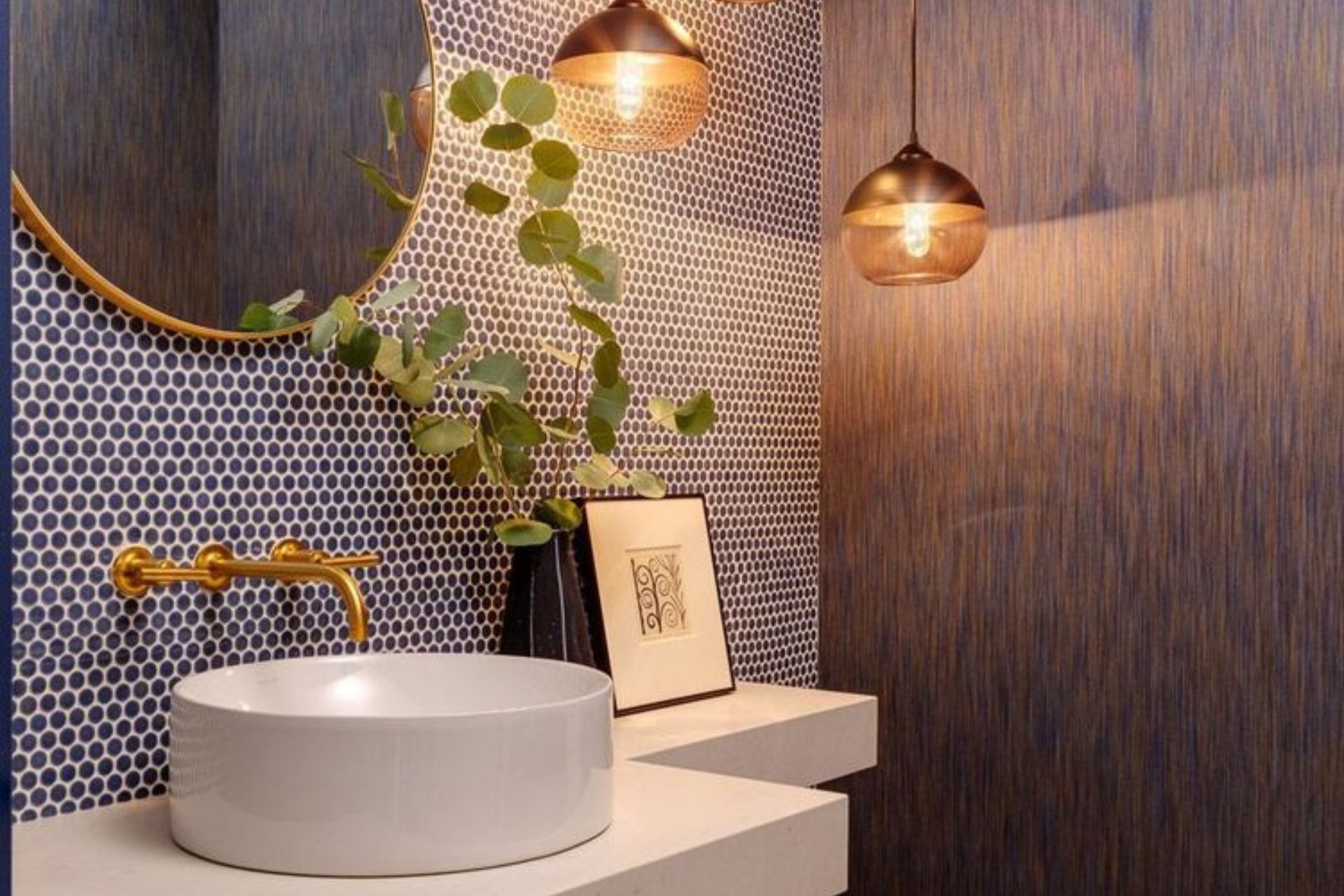
Detailed Cost Comparison for DIY vs. Professional Remodeling
When it comes to bathroom remodeling, deciding between doing it yourself or hiring a pro can significantly impact your budget—and your stress levels. While rolling up your sleeves can save money, some tasks are better left to the experts. Here’s a breakdown to help you figure out where to spend and where to save.
DIY-Friendly Tasks
- Painting: Refreshing the walls with a new coat of paint is a great DIY project. With paint costing around $20 to $50 per gallon and supplies like brushes and tape under $50, you can transform the space for under $100.
- Installing Shelves or Accessories: Hanging towel racks, shelves, or mirrors is another easy win. Basic shelving units cost $30 to $100, and you can often install them with just a screwdriver and level.
- Grouting and Caulking: Re-grouting tiles or caulking around the tub and sink are affordable DIY jobs, typically costing $10 to $30 for materials.
Tasks for the Pros
- Tiling: Laying tiles seems straightforward but requires precision and specialized tools. DIYing tile installation may cost $3 to $10 per square foot, but mistakes can lead to uneven tiles or cracks. Hiring a contractor for professional tiling costs $7 to $16.50 per square foot and ensures a flawless finish.
- Plumbing Work: Installing new fixtures like a sink, toilet, or shower requires plumbing expertise. DIY mistakes can lead to leaks or code violations. A plumber charges $45 to $200 per hour, but they’ll get the job done safely and up to code.
- Electrical Updates: Adding a new light fixture or relocating outlets might seem simple, but it’s a job for an electrician. Costs range from $150 to $500 depending on the complexity. DIY electrical work can be dangerous and may void your homeowner’s insurance if done improperly.
Cost Comparison Examples
- Installing a Toilet: DIY kits start around $150, but you’ll need to factor in tools like a wrench set if you don’t already own one. A plumber will charge $375 on average, including the toilet and installation.
- Shower Installation: A prefabricated shower kit might cost $600 if you install it yourself. For a custom shower, professional installation can run $6,000 to $10,000, but it ensures proper waterproofing and fit.
- Vanity Installation: Basic vanities cost $300 to $600. While DIY saves on labor, hiring a pro for $1,500 ensures proper plumbing connections and a level installation.
When to Call in the Pros
- Safety Concerns: Electrical and plumbing work can be risky if you don’t know what you’re doing. Fires, floods, or injuries aren’t worth the cost savings.
- Code Compliance: Major renovations often require permits and adherence to local building codes. Professionals handle this for you, ensuring you don’t face fines or delays.
- Complex Designs: Intricate tile patterns, custom cabinetry, or heavy installations (like a clawfoot tub) require experience and the right tools to execute correctly.
Pro Tip: Mix and Match
For the best of both worlds, consider a hybrid approach. Handle straightforward tasks like painting or installing hardware yourself and leave the technical work to the pros. This strategy keeps your budget in check while ensuring a polished, safe result.
In the end, the right balance depends on your comfort level, the project complexity, and how much time and effort you’re ready to invest.
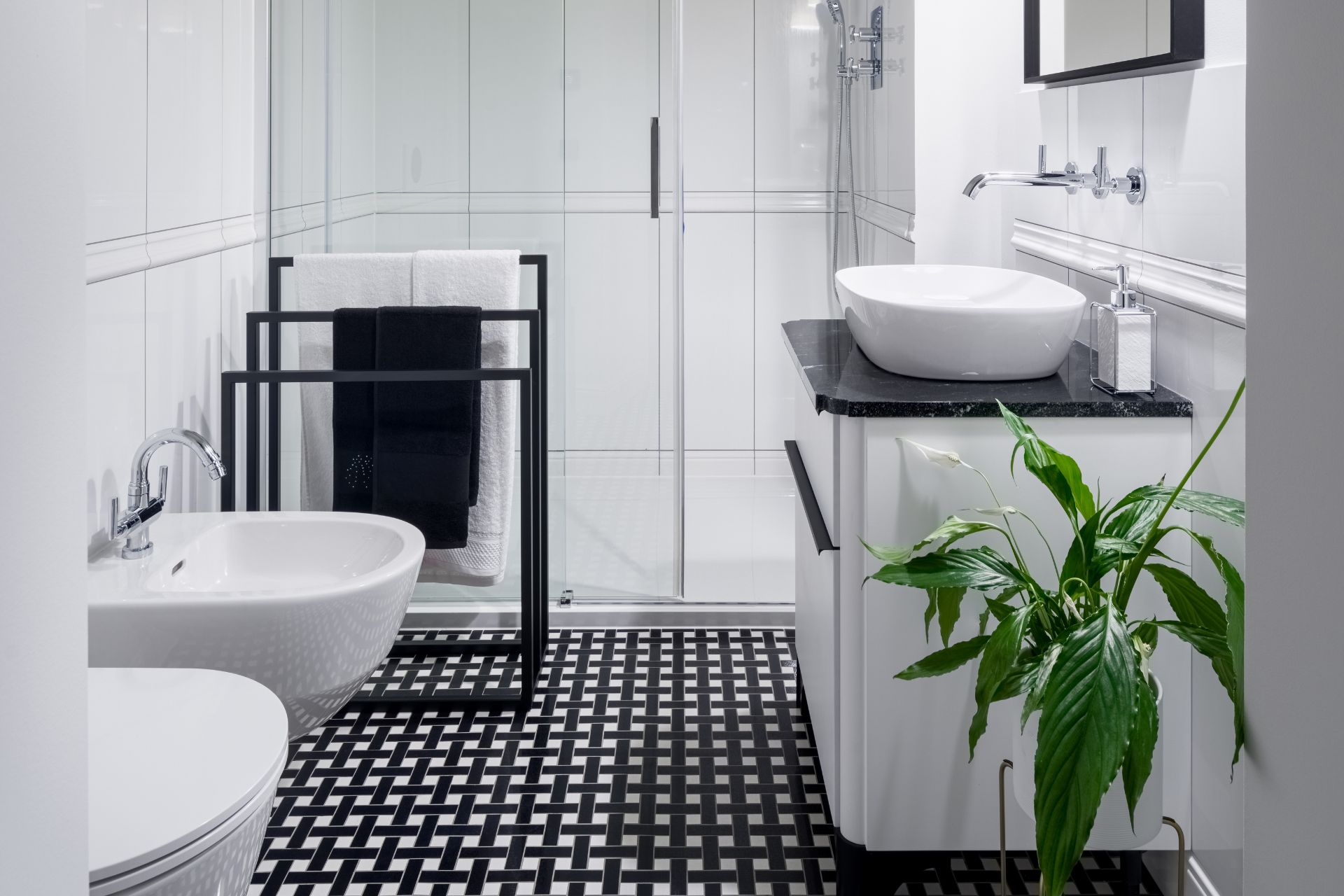
Common Questions
1. What is the average cost to remodel a bathroom?
The average bathroom remodel can range from $6,627 for moderate upgrades to as much as $30,000 for premium materials and extensive renovations. Smaller projects, such as installing a new toilet or faucet, can be completed for under $500 each. The final cost depends on the size of the bathroom, materials used, and whether any plumbing or electrical work is required.
2. How much does it cost to remodel a powder room?
Remodeling a powder room typically costs between $1,500 and $15,000, with an average of around $6,500. The price is influenced by factors such as the extent of the renovation, the materials used, and whether any structural changes are necessary. Even small updates like replacing the sink or toilet can significantly enhance the space and increase your home’s value.
3. What factors impact bathroom remodeling costs?
Several factors affect the overall cost of a bathroom remodel, including the size and layout of the bathroom, the choice of materials, fixtures, and finishes, as well as labor costs. Plumbing and electrical work, custom cabinetry, and luxury materials like marble can drive up the price, while refinishing existing fixtures and opting for prefabricated components can help reduce expenses.
